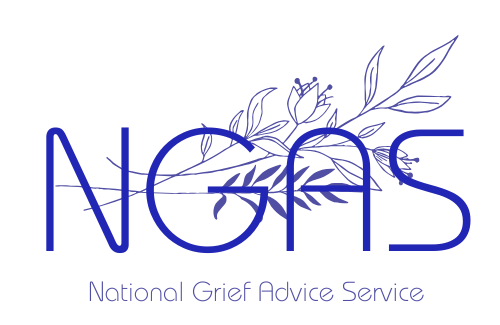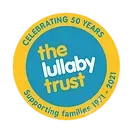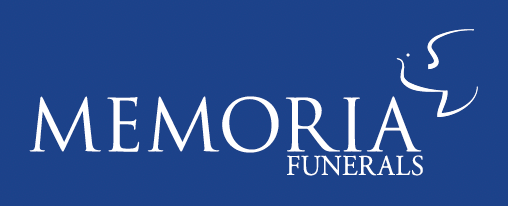Steps to take in the first days following a death
There are many practical steps which need to be taken in the first few days after a death. Unfortunately, this may be when you are feeling least able to cope with this type of responsibility.
The main thing is to ensure that, where possible, you have someone to help you as it is possible to feel completely overwhelmed at a time like this.
Make a list of people you need to inform of the deceased's passing
In addition to family members, friends, neighbours, work colleagues etc there are a number of formal notifications which need to be completed. This is where a friend or family member can help you most. For example, they could call one person and ask them to contact others on your list to inform them about the death, saving you some of the emotional distress whilst also helping to keep your phone line clear in case you are expecting calls from the doctor, funeral director etc. It might be useful to make a list of email addresses or mobile phone numbers which you don’t already have so that you can provide details about the funeral service, once it has been arranged, by email or text. In this way, you can choose to reduce the number of phone calls you need to make. Some people like to place a death notice in the local newspaper to inform people about the passing of the deceased and to give details about the funeral.

Make a list of people you need to inform of the deceased's passing
In addition to family members, friends, neighbours, work colleagues etc there are a number of formal notifications which need to be completed. This is where a friend or family member can help you most. For example, they could call one person and ask them to contact others on your list to inform them about the death, saving you some of the emotional distress whilst also helping to keep your phone line clear in case you are expecting calls from the doctor, funeral director etc. It might be useful to make a list of email addresses or mobile phone numbers which you don’t already have so that you can provide details about the funeral service, once it has been arranged, by email or text. In this way, you can choose to reduce the number of phone calls you need to make. Some people like to place a death notice in the local newspaper to inform people about the passing of the deceased and to give details about the funeral.
Register the death with the Registrar of Births, Marriages and Deaths
This has to be done within 5 days of the death unless a coroner is involved. The person registering the death should preferably be a relative. However, if this is not possible, it could be done by the person who was present when the person died, someone responsible for organising the funeral or by an administrator from the hospital or care home where the deceased died. If possible, take someone with you for support. Most registry offices operate an appointment system so it is wise to call ahead to arrange an appointment. You will also need to take some important documentation with you:
- the medical certificate signed by a doctor or coroner, confirming cause of death
- the full name of the deceased, including any other names they might have been known by (eg maiden name)
- their address
- the date and place of their death
- the date and place of their birth
- their most recent occupation and whether or not they had retired
- information about any pension or benefits they may have been claiming at the time of their death
- the name, date of birth and occupation of their spouse or civil partner if they had one, even if they have already died.
- if available, you could also take other forms of ID for the deceased, such as passport, driving licence, utility bill etc.
The registrar will provide you with a certificate for burial or cremation (commonly known as a Green Form in England and Wales or a Form GR021 in Northern Ireland). This gives permission for the burial or cremation to take place. You will also be given a unique code for the Tell Us Once Service (this is a service which allows you to notify the majority of government departments about the death in one go rather than having to contact them all individually). A form BD8 (a Registration of Notification of Death with the Department of Work and Pensions) might also be provided, though you may not need this if you opt to use the Tell Us Once Service. For a statutory fee of £11, the Registrar will also give you a death certificate which is required for a wide range of matters, including dealing with the deceased's financial and property affairs. As you will need to send this to multiple organisations, it is worth getting several certified copies at the time of registration since many organisations do not accept photocopies and it is more expensive to get copies after the initial registration. Since Covid, many registry offices will only take payment by card so it is a good idea to check this with them before attending the appointment.

Register the death with the Registrar of Births, Marriages and Deaths
This has to be done within 5 days of the death unless a coroner is involved. The person registering the death should preferably be a relative. However, if this is not possible, it could be done by the person who was present when the person died, someone responsible for organising the funeral or by an administrator from the hospital or care home where the deceased died. If possible, take someone with you for support. Most registry offices operate an appointment system so it is wise to call ahead to arrange an appointment. You will also need to take some important documentation with you:
- the medical certificate signed by a doctor or coroner, confirming cause of death
- the full name of the deceased, including any other names they might have been known by (eg maiden name)
- their address
- the date and place of their death
- the date and place of their birth
- their most recent occupation and whether or not they had retired
- information about any pension or benefits they may have been claiming at the time of their death
- the name, date of birth and occupation of their spouse or civil partner if they had one, even if they have already died.
- if available, you could also take other forms of ID for the deceased, such as passport, driving licence, utility bill etc.
The registrar will provide you with a certificate for burial or cremation (commonly known as a Green Form in England and Wales or a Form GR021 in Northern Ireland). This gives permission for the burial or cremation to take place. You will also be given a unique code for the Tell Us Once Service (this is a service which allows you to notify the majority of government departments about the death in one go rather than having to contact them all individually). A form BD8 (a Registration of Notification of Death with the Department of Work and Pensions) might also be provided, though you may not need this if you opt to use the Tell Us Once Service. For a statutory fee of £11, the Registrar will also give you a death certificate which is required for a wide range of matters, including dealing with the deceased's financial and property affairs. As you will need to send this to multiple organisations, it is worth getting several certified copies at the time of registration since many organisations do not accept photocopies and it is more expensive to get copies after the initial registration. Since Covid, many registry offices will only take payment by card so it is a good idea to check this with them before attending the appointment.
Find important paperwork
This includes the Will (if the deceased had one), bank and building society account details, cheque books and bank cards, pension and/or benefits details, Lasting Powers of Attorney, details of employers (if appropriate), passport, driving licence, details of insurance and utility companies, medical providers, details of a landlord (if appropriate) etc. (Remember to use the Tell Us Once Service if this is available in that area.) Make sure that the documents are all put in a safe place so that you can find them quickly and easily when the need arises.

Find important paperwork
This includes the Will (if the deceased had one), bank and building society account details, cheque books and bank cards, pension and/or benefits details, Lasting Powers of Attorney, details of employers (if appropriate), passport, driving licence, details of insurance and utility companies, medical providers, details of a landlord (if appropriate) etc. (Remember to use the Tell Us Once Service if this is available in that area.) Make sure that the documents are all put in a safe place so that you can find them quickly and easily when the need arises.
Arrange the funeral
The Will might indicate which funeral directors the deceased wished to be used for their funeral. However, if no funeral director was specified, click here for a list of funeral directors in your area. As well as a Will, the deceased might have a Memorandum or Letter of Wishes stating their specific wishes for how their funeral should be carried out. Ideally, this should have been stored with the Will. If there are no specific wishes, you might want to consider how the funeral service could reflect any beliefs held by the deceased. For example, some people might prefer to have a Humanist funeral service rather than a religious one or they might have preferred to have no funeral service at all. In addition, there might be details of a pre-paid funeral plan which could provide details of their wishes regarding the funeral service and where they would like to be buried or cremated. The pre-paid plan will help you to ensure that the funeral is as the deceased wished it to be whilst also removing the financial burden of a funeral. Funeral directors are obviously very experienced in handling formal matters associated with death and as such are a useful source of information about a range of subjects. They can also help you to ensure that all the necessary forms are completed appropriately and within the required timescale.
Depending on the wishes of the deceased, you may also need to organise flowers and a wake though it is best not to do this until you have a confirmed date for the funeral service. You will also need to inform people attending the service about its date and location.
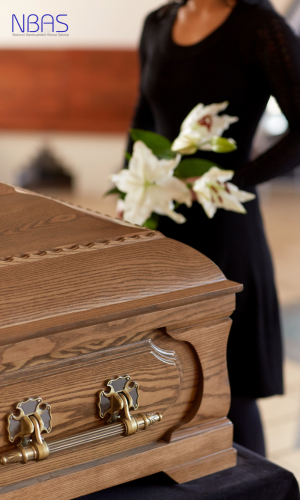
Arrange the funeral
The Will might indicate which funeral directors the deceased wished to be used for their funeral. However, if no funeral director was specified, click here for a list of funeral directors in your area. As well as a Will, the deceased might have a Memorandum or Letter of Wishes stating their specific wishes for how their funeral should be carried out. Ideally, this should have been stored with the Will. If there are no specific wishes, you might want to consider how the funeral service could reflect any beliefs held by the deceased. For example, some people might prefer to have a Humanist funeral service rather than a religious one or they might have preferred to have no funeral service at all. In addition, there might be details of a pre-paid funeral plan which could provide details of their wishes regarding the funeral service and where they would like to be buried or cremated. The pre-paid plan will help you to ensure that the funeral is as the deceased wished it to be whilst also removing the financial burden of a funeral. Funeral directors are obviously very experienced in handling formal matters associated with death and as such are a useful source of information about a range of subjects. They can also help you to ensure that all the necessary forms are completed appropriately and within the required timescale.
Depending on the wishes of the deceased, you may also need to organise flowers and a wake though it is best not to do this until you have a confirmed date for the funeral service. You will also need to inform people attending the service about its date and location.
Paying for the funeral
Your funeral director will inform you about the fees associated with the funeral. As stated above, the deceased might have already paid for their funeral. If not, it might be that they had an insurance policy for this purpose. Failing that, the fees will need to come from the deceased’s estate.
Most banks and building societies will arrange for these fees to be paid from the account if there are sufficient funds in it. You would need to provide an original or certified copy of the death certificate, an invoice from the funeral directors with your name and address on it and some form of ID to prove your identify (eg passport, utility bill, driving licence etc).
However, the deceased may have died without leaving sufficient funds for their funeral. In this case, it is possible to arrange finance to meet the costs, should you wish to do so.
Finally, in some specific circumstances, the DWP Bereavement Service might be able to help in the form of a Funeral Expenses Payment. You can contact them on 0800 151 2012.
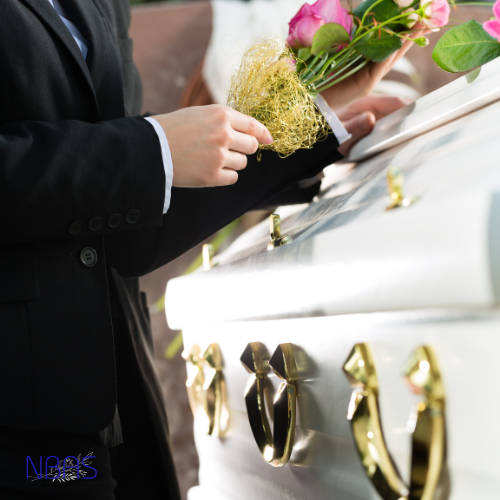
Paying for the funeral
Your funeral director will inform you about the fees associated with the funeral. As stated above, the deceased might have already paid for their funeral. If not, it might be that they had an insurance policy for this purpose. Failing that, the fees will need to come from the deceased’s estate.
Most banks and building societies will arrange for these fees to be paid from the account if there are sufficient funds in it. You would need to provide an original or certified copy of the death certificate, an invoice from the funeral directors with your name and address on it and some form of ID to prove your identify (eg passport, utility bill, driving licence etc).
However, the deceased may have died without leaving sufficient funds for their funeral. In this case, it is possible to arrange finance to meet the costs, should you wish to do so.
Finally, in some specific circumstances, the DWP Bereavement Service might be able to help in the form of a Funeral Expenses Payment. You can contact them on 0800 151 2012.
If applicable, notify the Office of the Public Guardian of the death
The deceased may have appointed attorneys for their Health and Welfare and/or Property and Financial Affairs. If so, you will need to notify the OPG of their death. This can be done by phone (0300 456 0300), email or letter. See https://www.gov.uk/government/organisations/office-of-the-public-guardian for contact details and advice.

If applicable, notify the Office of the Public Guardian of the death
The deceased may have appointed attorneys for their Health and Welfare and/or Property and Financial Affairs. If so, you will need to notify the OPG of their death. This can be done by phone (0300 456 0300), email or letter. See https://www.gov.uk/government/organisations/office-of-the-public-guardian for contact details and advice.
Creating a file regarding the estate
Once you have tackled the main tasks of notifying people about the death, registering the death and arranging the funeral, it is important to create an information file about the deceased’s estate – the assets they owned at the time of their death. This could be money, property or even just personal possessions, depending on their circumstances. Any cash or valuables, along with a valid Will if you can find one, will need to be placed somewhere secure. Once you have found all the relevant paperwork, it’s a good idea to make a list of any monies in bank or building society accounts, any insurance policies and the amounts to be paid out, any pension or benefit payments etc. It is also necessary to make a list of any debts owed by the deceased eg utility bills, mortgage or rent payments etc so that these can be settled by the estate. Creating a file of contact numbers and account numbers would be very helpful at this stage.
Creating a file regarding the estate
Depending on the deceased’s circumstances, it may be necessary to make payments relating to the property eg home and buildings insurance, utility bills, mortgage or rent, council tax, personal loans etc. When contacting the relevant companies, ask if they have a Bereavement Department as they will be used to helping people in your situation and can provide invaluable support and advice. If the deceased lived alone in a rented property, either private or through a council or housing association, be aware that there may be strict deadlines for emptying the property of their personal possessions in order to avoid incurring further costs.

Creating a file regarding the estate
Once you have tackled the main tasks of notifying people about the death, registering the death and arranging the funeral, it is important to create an information file about the deceased’s estate – the assets they owned at the time of their death. This could be money, property or even just personal possessions, depending on their circumstances. Any cash or valuables, along with a valid Will if you can find one, will need to be placed somewhere secure. Once you have found all the relevant paperwork, it’s a good idea to make a list of any monies in bank or building society accounts, any insurance policies and the amounts to be paid out, any pension or benefit payments etc. It is also necessary to make a list of any debts owed by the deceased eg utility bills, mortgage or rent payments etc so that these can be settled by the estate. Creating a file of contact numbers and account numbers would be very helpful at this stage.
Creating a file regarding the estate
Depending on the deceased’s circumstances, it may be necessary to make payments relating to the property eg home and buildings insurance, utility bills, mortgage or rent, council tax, personal loans etc. When contacting the relevant companies, ask if they have a Bereavement Department as they will be used to helping people in your situation and can provide invaluable support and advice. If the deceased lived alone in a rented property, either private or through a council or housing association, be aware that there may be strict deadlines for emptying the property of their personal possessions in order to avoid incurring further costs.
Arranging for pet care
In some cases, for example if the deceased had a pet but lived alone, you may need to organise temporary or permanent care for the pet.
Some people make provisions in their Will as to what should happen in the event of their death while others are members of a rehoming scheme such as Cats Protection ‘Cat Guardian’ scheme or the Dogs Trust ‘Canine Care Card’ scheme.

Arranging for pet care
In some cases, for example if the deceased had a pet but lived alone, you may need to organise temporary or permanent care for the pet.
Some people make provisions in their Will as to what should happen in the event of their death while others are members of a rehoming scheme such as Cats Protection ‘Cat Guardian’ scheme or the Dogs Trust ‘Canine Care Card’ scheme.
